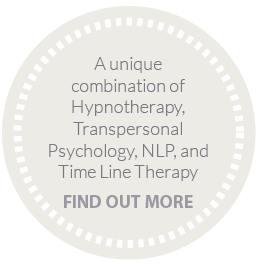It might help at this point to clear up some misunderstandings you might have about what hypnosis really is.
Hypnosis is simply a state of highly focused, narrowed attention, a state in which we become better at learning because this narrowing of focus makes us more ‘suggestible’. So it makes sense that the kind of learning we do in natural (as well as therapeutically induced) hypnotic states tends to be subconscious learning. That is, we learn, but are not aware that we are learning as we are in an altered state of consciousness. But conscious learning also takes place in hypnotic states. Any activity you do, with common examples by walking, talking and driving a car, are all subconscious processes that started out as a narrowed conscious focus, so that eventually, we steps we take become effortless.
So whatever you have really learnt throughout life, you have learnt in a state of trance. Whether it was good or bad, whether you were learning consciously or unconsciously, your attention was narrowly focused on the learning, while other elements of your experience were left out. The same principle applies to learning inappropriate emotional responses, such as compulsive fears known as phobias.
Will I lose ‘control’ of myself in hypnosis?
No. In fact, rest assured that you always maintain full control of your own mind when in hypnosis. Nobody can make you do something you don’t want to do.
During Hypnosis you are in fact in greater control of your faculties than ever. You will not give away secrets or lose reasoning whilst in Hypnosis.
So what about Stage Hypnosis – is it the same?
Not at all.
Clinical hypnotherapy is the use of hypnosis for assisting people therapeutically, so ‘clinical’ hypnosis is certainly not for entertainment.
I’ve found it useful for people to speak with me for a no-obligation Free Consultation before booking a session. During this first consultation, no hypnosis will occur, and you will have the opportunity to ask me questions for gaining further reassurance as to what a typical hypnotherapy session is like.
So please remember, any hypnotherapy-based change work is about assisting you to access hypnotic states at will (as we all learn and re-learn subconsciously), which can empower you to continue in making great positive changes by yourself.
You must be weak minded if you can be hypnotised
The truth is that everyone can go into a hypnotic trance, and in fact, we each use a state of hypnosis in some form every single day of our lives, often without being aware that we are.
We are experiencing a trance-like hypnotic state, really an ‘altered state of consciousness’, whenever we engage our imagination, our emotions, in fact any time we focus our attention inwardly on our own subjective experience.
So when we consider hypnosis as an altered state of consciousness, strength-of=mind really has little to do with it. A weak-minded or strong-minded person who resists will make a poor hypnotic subject. On the other hand, a weak or strong-minded person who cooperates will be a good subject. Because hypnosis helps a person gain greater control over both mind and body, it can help a person develop a stronger mind.
You are asleep when in a hypnotic trance.
Many years ago hypnotherapists did use suggestions of ‘sleep’ when guiding someone into a hypnotic trance. However this is rarely done now as most hypnotherapists agree that this can confuse the subject as to what state of mind they are aiming to achieve. Most now use suggestions of deep relaxation rather than sleep. However the media seem to still continue to portray a very out-dated image of a hypnotist.
People sometimes become stuck in hypnosis.
This is simply not true, despite what the tabloid press occasionally claim. On rare occasions a subject may not come out of the trance straight away. This is usually because they are enjoying the relaxing state so much that they don’t want to come out. A few gentle prompts, such as threatening to charge double for a longer session, is always sufficient to wake them!
You will become stuck in hypnosis if something happens to the hypnotist.
Again this is not true. A person will eventually become bored and will just get up when they feel like it. The hypnotist holds no special power over the subject whatsoever. In fact a person can hypnotise themselves. This is called self-hypnosis, and they can wake themselves whenever they choose.
You are not hypnotised if you can hear the hypnotist.
This is also not true. Each person has a unique experience of hypnosis. Some people consciously hear the hypnotist, whereas others do not. This has no bearing on the success of the session whatsoever. It is usually down to choice. You can choose to allow your mind to drift away, or you can choose to listen carefully to what the hypnotherapist is saying. Some people simply cannot resist allowing their minds to drift away, as they gain so much relaxation pleasure from it.
You can be made to reveal your deepest secrets when in a hypnotic trance.
Since your mind is fully aware and awake during a hypnotic session, this is not possible. If you really do not want to talk about something then you are under no compulsion to do so. A person can easily lie and are more likely to be creative with the truth when in a hypnotic trance, which is why courts will not accept the testimony of witnesses who are in hypnosis.
Hypnotherapists have special powers.
It’s funny how even quite intelligent people sometime believe this! A hypnotist is a normal person who eats, sleeps, feels happy and sad, and loses their car keys. There is nothing special or magical about them at all. We have simply been trained, and have honed this training with experience, to help guide people into a hypnotic state.
A stage hypnotist may play on having ‘hypnotic powers’ in order to add excitement and drama to their shows, but they too will readily admit that they are simply using techniques that have been learnt and developed with practice and experience.
So there you go, hypnosis and hypnotherapy is not magical or mysterious when you know the true facts. It is simply a group of techniques for focusing the mind so that the unconscious can absorb pre agreed suggestions, in order to facilitate change.
References
http://www.instituteofclinicalhypnosis.com/common-myths-hypnosis/



